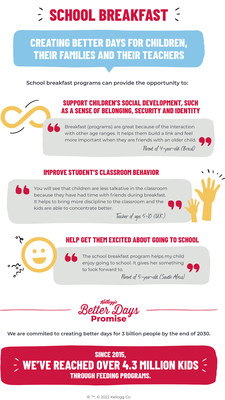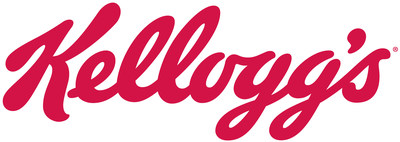New research underscores importance of school breakfast programs
Kellogg Company released research on the positive impacts of school breakfast programs on children's social skills and classroom behavior. The study, conducted in countries like Brazil, India, and the U.S., found that these programs significantly enhance children's ability to engage in school and improve overall discipline. Since 2015, Kellogg has supported feeding initiatives reaching 4.3 million children globally. This initiative aligns with Kellogg's Better Days Promise, aiming to positively affect 3 billion people by 2030.
- Research shows school breakfast programs enhance children's social skills and classroom behavior.
- Kellogg has reached 4.3 million children through feeding programs since 2015.
- Initiatives support Kellogg's Better Days Promise to impact 3 billion people by 2030.
- None.
Insights
Analyzing...
Children's social skills and development, and classroom behavior positively impacted
BATTLE CREEK, Mich., Oct. 26, 2022 /PRNewswire/ -- Kellogg Company today unveiled new research on school breakfast programs that builds on previous studies of the impact breakfast programs can have on children.
Kellogg Company Fund, one of the company's charitable arms, commissioned the research in 2022 to develop a deeper understanding of the benefits of school and community breakfast programs. The research was conducted in five countries where breakfast programs are at different stages of development: Brazil, India, South Africa, the U.K. and the U.S.
The main objective was to learn more about the impact these initiatives have on:
- Children's abilities to participate at school
- Children's social skills from the perspective of parents
- Children's social skills from the perspective of teachers/administration staff
School breakfast programs are an established intervention in schools and communities around the world. While their primary aim is to provide healthy food where food insecurity may be an issue, many have evolved to provide the opportunity to complete homework, play and socialize.
This can lead to benefits, such as:
- Supporting children's social development
- Improving students' classroom behavior
- Making children who attend breakfast programs excited about going to school
"You will see that children are less talkative in the classroom because they have had time with friends during breakfast," said a U.K. teacher of students ages 5-10. "It helps to bring more discipline to the classroom and the kids are able to concentrate better."
Said a parent of a 4-year-old in Brazil: "Breakfast (programs) are great because of the interaction with other age ranges. It helps them build a link and feel more important when they are friends with an older child."
Since 2015, Kellogg has reached 4.3 million children through feeding programs around the world, including our longstanding commitment to creating and supporting breakfast clubs.
Those efforts and this new research are part of Kellogg's(TM) Better Days Promise environmental, social and governance (ESG) strategy, which aims to create better days for 3 billion people by the end of 2030.
At Kellogg Company (NYSE: K), our vision is a good and just world where people are not just fed but fulfilled. We are creating better days and a place at the table for everyone through our trusted food brands. Our beloved brands include Pringles®, Cheez-It®, Special K®, Kellogg's Frosted Flakes®, Pop-Tarts®, Kellogg's Corn Flakes®, Rice Krispies®, Eggo®, Mini-Wheats®, Kashi®, RXBAR®, MorningStar Farms® and more. Net sales in 2021 were nearly
![]() View original content to download multimedia:https://www.prnewswire.com/news-releases/new-research-underscores-importance-of-school-breakfast-programs-301660030.html
View original content to download multimedia:https://www.prnewswire.com/news-releases/new-research-underscores-importance-of-school-breakfast-programs-301660030.html
SOURCE Kellogg Company









